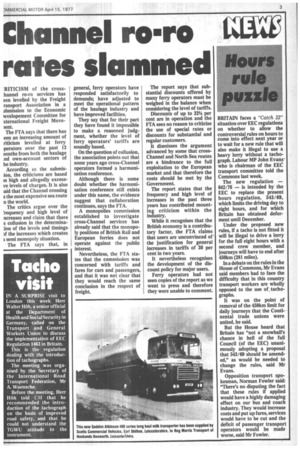:RITICISM of the crosshannel ro-ro services has een levelled by
Page 5

If you've noticed an error in this article please click here to report it so we can fix it.
the Freight ransport Association in a ubmission to the Economic oevelopement Committee for aternational Freight Movelent.
The FTA says that there has .een an increasing amount of riticism levelled at ferry iperators over the past 12 nonths from both the haulage .nd own-account sectors of he industry.
According to the submisIon, the criticisms are based in high and allegedly excessve levels of charges. It is also ;aid that the Channel crossing s the most expensive sea route n the world.
The critics argue over the 'requency and high level of ncreases and claim that there s collusion in the determina:ion of the levels and timings A the increases which creates semi monopoly situation. The FTA says that, in general, ferry operators have responded satisfactorily to demands; have adjusted to meet the operational pattern of the haulage industry and have improved facilities.
They say that for their part they have found it impossible to make a reasoned judgment, whether the level of ferry operators' tariffs are soundly based.
On the question of collusion, the association points out that some years ago cross-Channel operators formed a harmonisation conference.
Although there is some doubt whether the harmonisation conference still exists under this name, the evidence suggest that collaboration continues, says the FTA.
A monopolies commission established to investigate cross-Channel services has already said that the monopoly positions of British Rail and European ferries does not operate against the public interest.
Nevertheless, the FTA states that the commission was concerned with tariffs and fares for cars and passengers, and that it was not clear that they would reach the same conclusion in the respect of freight. The report says that substantial discounts offered by many ferry operators must be weighed in the balance when considering the level of tariffs. Discounts of up to 32% per cent are in operation and the FTA sees no reason to criticise the use of special rates or discounts for substantial and regular customers.
It dismisses the argument advanced by some that cross Channel and North Sea routes are a hindrance to the full exploitation to the European market and that therefore the costs should be met by the Government.
The report states that the frequency and high level of increases in the past three years has contributed mounting criticism within the industry.
While it recognises that the British economy is a contributory factor, the FTA claims that users are unconvinced of' the justification for general increases in tariffs of 30 per cent in two years.
It nevertheless recognises the development of the discount policy for major users.
Ferry operators had not seen copies of the report as we went to press and therefore they were unable to comment.




























































































